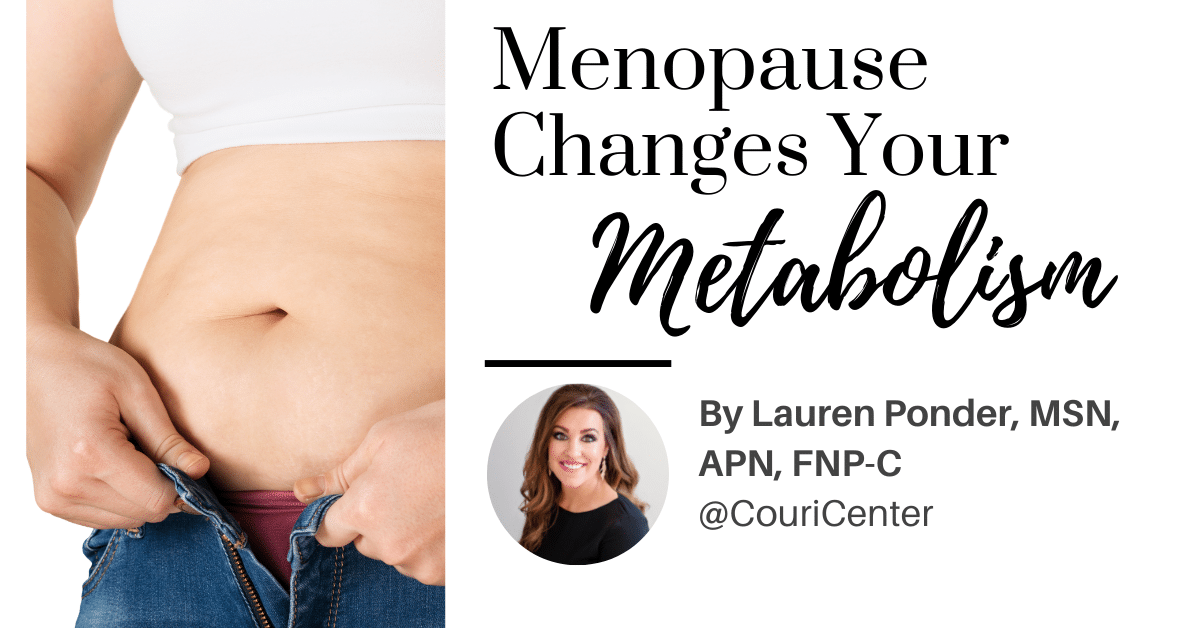
Menopause Changes Your Metabolism By Lauren Ponder, MSN, APN, FNP-C
Most women are aware of the significant changes occurring during the transition into menopause. No group is more aware of these changes than those who have experienced them personally. From vasomotor symptoms, including hot flashes and night sweats, to metabolic changes such as weight gain and belly fat, the symptoms of menopause are well known. Still, the reasoning behind these changes is less understood.
The average age for women who go through menopause is between 45-55 yrs old, and the life expectancy for a female living in the United States is estimated to be around 80.4 yrs old, according to the CDC (2020). Given those estimations, women are likely to live for 35+ years, or almost half of their lives in menopause. That is a significant amount of time to live with the unwanted effects of menopause, and it is essential to understand why those changes occur and what can be done about them.
Menopause is a natural age-related occurrence that marks the end of the reproductive years in a woman. By definition, menopause occurs after 12 consecutive months without a period. The process starts sometime in the early 40s and continues through the years until the cessation of menses occurs. In that time frame, women may notice various symptoms, including hot flashes, night sweats, emotional changes, brain fog, weight gain, belly fat, trouble sleeping, and many more.
But what causes these symptoms?
During perimenopause, the time leading up to menopause, women’s hormones start to change, including a decrease in the estrogen the ovaries produce. Estrogen plays a crucial role in regulating the different functions in our body, especially as it relates to our basal metabolic rate, also known as metabolism. Our metabolism determines how fast or slow our body turns stored energy into working energy and the rate at which we burn calories. Estrogen deficiency accelerates the loss of muscle mass and increases the amount of visceral (abdominal) fat in our bodies. This change in body composition results in a slower metabolic rate than pre-menopause because skeletal muscle’s metabolic rate is three times higher than that of adipose tissue (Ko et al., 2021). Thus, a slower metabolism coupled with the increase in visceral fat accumulation is what causes the weight gain and “belly fat” that many women experience during this time.
Not only is the weight gain and abdominal fat associated with menopause aesthetically unpleasing, it can also put women at increased risk for cardiovascular disease, elevated blood sugar, lipid dysregulation, and certain cancers. Estrogen is synthesized in the ovary by LDL cholesterol. When estrogen levels decrease, the LDL is no longer used to synthesize estrogen and therefore remains in the systemic circulation causing high levels of LDL- the “bad cholesterol.” The increase in abdominal fat tissue triggers increased free fatty acids, which can not be used as an efficient fuel source in the body, causing insulin resistance and metabolic disease (Ko et al., 2021).
So what can be done to help prevent or counteract these menopause-related changes?
First, it is imperative to eat a well-balanced diet that is low in refined sugars and processed foods and ensure you are getting adequate exercise. In addition to nutrition and exercise, many studies have shown that hormone replacement therapy (HRT) positively impacts curbing some of these unwanted symptoms, especially the sooner it is initiated. In one study done by Sayegh et al. (1999), they compared 169 postmenopausal women that were divided into two groups, those on hormone replacement therapy and those that were not. Their study showed “the only factor significantly associated with lower fat and BMI was the use of HRT. Women who were taking HRT had significantly lower percentages of body fat (-4.8%; p < 0.001) and BMI (-2.6 kg/m2; p < 0.001) compared with nonusers.” Similarly, in a systematic review of estrogen deficiency’s impact on obesity during menopause (Lizcano & Guzman, 2014), it was found that “hormone replacement therapy in menopausal women has been shown to lower visceral adipose tissue, fasting serum glucose, and insulin levels. Estrogens also reduce the cardiovascular risk factors that increase during menopause when given to women without contraindications to HRT. Therefore, estrogen therapy may exert a positive impact by reducing total cholesterol and relative LDL levels.” They also highlighted the vital role of estrogen receptors in the brain’s hypothalamus on food consumption, energy expenditure, and fat distribution. The positive impact HRT has on the metabolic changes associated with menopause can decrease the extent of unwanted symptoms and reduce the burden of cardiovascular related disease.
We are always accepting new patients. To schedule, call 309-692-6838 or email us. We’re here to help.
Lauren Ponder, MSN, APN, FNP-C
Sources:
Ko S-H, Jung Y. Energy Metabolism Changes and Dysregulated Lipid Metabolism in Postmenopausal Women. Nutrients. 2021; 13(12):4556. https://doi.org/10.3390/nu13124556
Lizcano, F., & Guzmán, G. (2014). Estrogen Deficiency and the Origin of Obesity during Menopause. BioMed research international, 2014, 757461. https://doi.org/10.1155/2014/757461
Sayegh RA, Kelly L, Wurtman J, Deitch A, Chelmow D. Impact of hormone replacement therapy on the body mass and fat compositions of menopausal women: a cross-sectional study. Menopause. 1999 Winter;6(4):312-5. doi: 10.1097/00042192-199906040-00007. PMID: 10614678.
